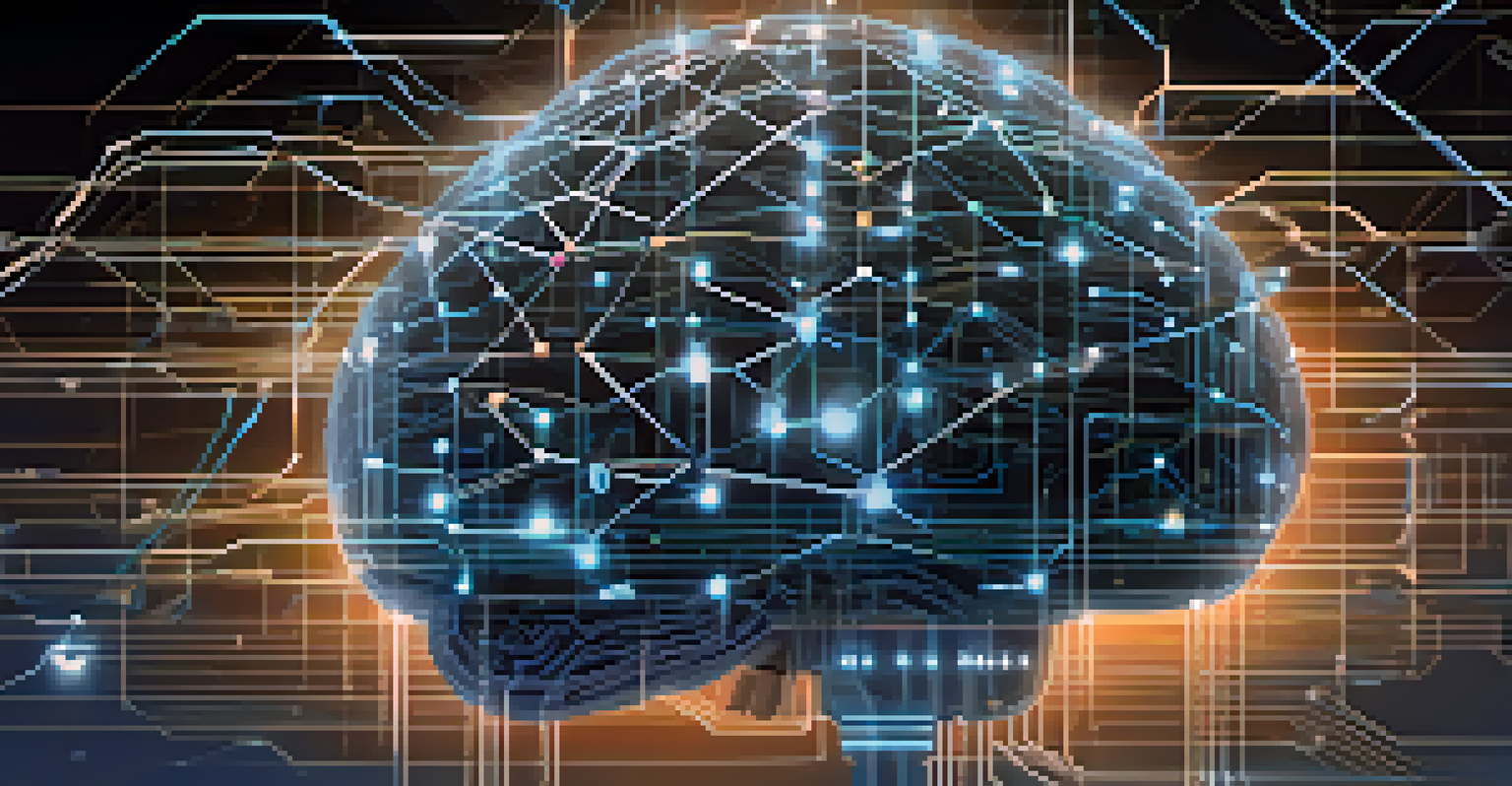AI in Cloud Security: Protecting Data Privacy in the Cloud

Understanding Cloud Security and Its Importance
Cloud security refers to the policies, technologies, and controls that protect data, applications, and infrastructure involved in cloud computing. As businesses increasingly rely on cloud services, safeguarding sensitive information from breaches becomes crucial. With the rise of remote work and digital transactions, the stakes for protecting data privacy have never been higher.
Security is not a product, but a process.
By ensuring robust cloud security measures, organizations can prevent unauthorized access and mitigate potential risks. This not only protects client information but also upholds the company's reputation. In an era where data breaches can lead to financial loss and legal consequences, understanding the importance of cloud security is vital.
Moreover, as cyber threats evolve, relying on traditional security methods is increasingly insufficient. This is where innovative technologies, particularly artificial intelligence (AI), come into play, creating a new frontier in cloud security.
The Role of AI in Enhancing Cloud Security
Artificial intelligence plays a transformative role in cloud security by automating threat detection and response processes. AI algorithms analyze vast amounts of data to identify patterns and anomalies that might indicate a security breach. This capability allows organizations to act quickly, minimizing the potential damage from cyber attacks.

Additionally, AI can predict future threats based on historical data, giving businesses a proactive approach to security. By learning from previous incidents, AI systems can improve their detection capabilities over time, becoming more effective with each passing day. This continuous learning aspect is what sets AI apart from traditional security measures.
Moreover, AI-driven tools can help streamline security operations, allowing IT teams to focus on strategic initiatives rather than getting bogged down in routine monitoring tasks. This efficiency not only enhances security but also allows for better resource allocation within organizations.
Data Privacy Concerns in Cloud Environments
Data privacy is a significant concern for organizations utilizing cloud services. With sensitive information often stored off-site, companies must ensure that their data is adequately protected against unauthorized access and breaches. The challenge lies in maintaining control over data once it is transferred to the cloud.
The greatest danger in times of turbulence is not the turbulence; it is to act with yesterday's logic.
Regulations like GDPR and CCPA emphasize the importance of data privacy, requiring organizations to implement strict measures to protect personal information. Non-compliance can result in hefty fines and damage to a company's reputation. Therefore, understanding the nuances of data privacy laws is essential for businesses operating in the cloud.
AI can assist in this area by ensuring compliance with data privacy regulations. By automating data management processes and monitoring access, AI tools can help organizations maintain control over their sensitive information while still benefiting from the flexibility of cloud services.
AI-Powered Threat Detection: How It Works
AI-powered threat detection employs machine learning algorithms to analyze user behavior and network traffic in real-time. By establishing a baseline of normal activity, these systems can quickly identify any deviations that may signal a potential threat. This rapid identification is critical in minimizing the impact of security incidents.
For instance, if an employee's account suddenly accesses sensitive files at odd hours, an AI system can flag this unusual behavior for further investigation. This capability enables organizations to respond to threats before they escalate, safeguarding data privacy in the process. The speed and accuracy of AI-driven systems significantly outpace traditional methods.
Moreover, the integration of AI with other security tools can create a comprehensive defense strategy. By combining various technologies, organizations can enhance their overall security posture and ensure that data privacy remains a top priority.
The Benefits of AI-Driven Security Solutions
Implementing AI-driven security solutions offers numerous benefits for organizations using cloud services. Firstly, these solutions enhance threat detection and response times, allowing businesses to mitigate risks more effectively. The proactive nature of AI ensures that potential issues are addressed before they can escalate into significant problems.
Secondly, AI can reduce operational costs by automating routine tasks and streamlining security processes. This not only saves time but also allows security teams to focus on more complex issues that require human intervention. Efficiency in security operations directly correlates with improved data privacy measures.
Lastly, AI-driven solutions can help organizations build customer trust. By demonstrating a commitment to data privacy and security, businesses can differentiate themselves in a competitive market, ultimately leading to greater customer loyalty and satisfaction.
Challenges of Implementing AI in Cloud Security
While AI offers significant advantages in cloud security, implementing these solutions comes with its own set of challenges. One of the primary concerns is the potential for false positives, where legitimate user activities are incorrectly flagged as threats. This can lead to unnecessary escalations and resource allocation issues for security teams.
Moreover, the complexity of integrating AI systems with existing security infrastructure can pose difficulties. Organizations must ensure that new AI tools work seamlessly with current protocols and systems. This requires careful planning and a clear understanding of both the current environment and the capabilities of the AI solutions being implemented.
Finally, there is the challenge of maintaining data privacy when using AI systems. Organizations must ensure that the AI tools they implement comply with data protection regulations and do not inadvertently expose sensitive information during their operation.
Future Trends: AI and Cloud Security
As technology continues to evolve, the future of AI in cloud security looks promising. Emerging trends suggest that AI will play an even more significant role in predictive analytics, helping organizations stay one step ahead of cyber threats. By anticipating potential vulnerabilities, businesses can proactively strengthen their defenses.
Additionally, advancements in AI algorithms will likely lead to more sophisticated threat detection capabilities. This means that security systems will become increasingly adept at identifying complex attack patterns and responding accordingly. As a result, organizations can enjoy enhanced data privacy and security in the cloud.

Furthermore, the collaboration between AI and human expertise will be crucial. While AI can automate many processes, the human element is irreplaceable in strategic decision-making and ethical considerations. The future of cloud security will be a balanced partnership between AI capabilities and human oversight.